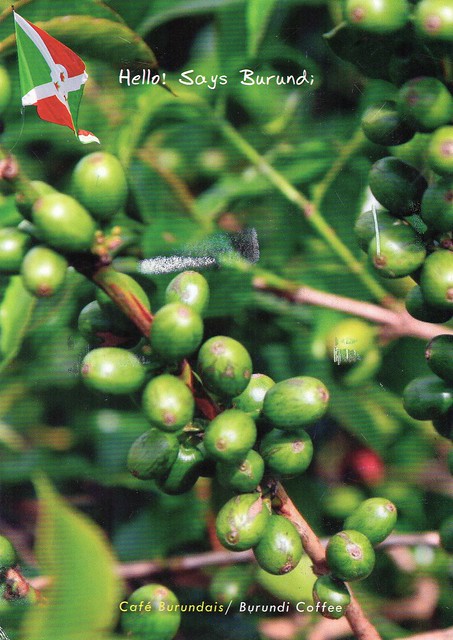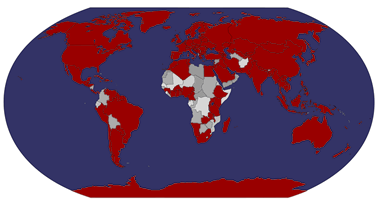I don't get to add a new country to my postcard collection too often anymore. This is the most recent addition to that collection. I never really expected to receive a postcard from Burundi, so I was very happy to receive this one.
Burundi, officially the Republic of Burundi, is a landlocked country in the African Great Lakes region of East Africa, bordered by Rwanda to the north, Tanzania to the east and south, and the Democratic Republic of the Congo to the west. It is also sometimes considered part of Central Africa. Burundi's capital is Bujumbura. Although the country is landlocked, much of the southwestern border is adjacent to Lake Tanganyika.
The Twa, Hutu and Tutsi peoples have lived in Burundi for at least five hundred years. For more than 200 years, Burundi had an indigenous kingdom. At the beginning of the twentieth century, Germany colonized the region. After the First World War and Germany's defeat, it ceded the territory to Belgium. The Belgians ruled Burundi and Rwanda as a European colony known as Ruanda-Urundi. Their intervention exacerbated social differences between the Tutsi and Hutu, which contributed to political unrest in the region. There was civil war in Burundi as it fought for independence in the middle of the twentieth century. Presently, Burundi is governed as a presidential representative democratic republic.
Burundi is one of the five poorest countries in the world. It has one of the lowest per capita GDPs of any nation in the world. The country has suffered from warfare, corruption and poor access to education. Burundi is densely populated and has had substantial emigration as young people seek opportunities elsewhere. According to a 2012 DHL Global Connectedness Index, Burundi is the least globalized of 140 surveyed countries.
According to the Global Hunger Index of 2013, Burundi has an indicator ratio of 38.8, earning the nation the distinction of being the hungriest country in the world in terms of percentage.
Burundi's largest industry is agriculture, which accounted for just over 30% of the GDP. Subsistence agriculture accounts for 90% of agriculture. The nation's largest source of revenue is coffee, which makes up 93% of Burundi's exports. Other agricultural products include cotton, tea, maize, sorghum, sweet potatoes, bananas, manioc (tapioca); beef, milk, and hides. Foreign Policy reports, Subsistence farming is highly relied upon, however due to large population growth and no coherent policies governing land ownership, many people don't have the resources to sustain themselves. In 2014, the average farm size was about one acre.
Subscribe to:
Post Comments (Atom)





 Maroon
Maroon 










































































































































































1 comment:
Your postal stamps is really very beautiful. And I like your Stamps. Thank you very much for sharing
Pincodezone
Post a Comment